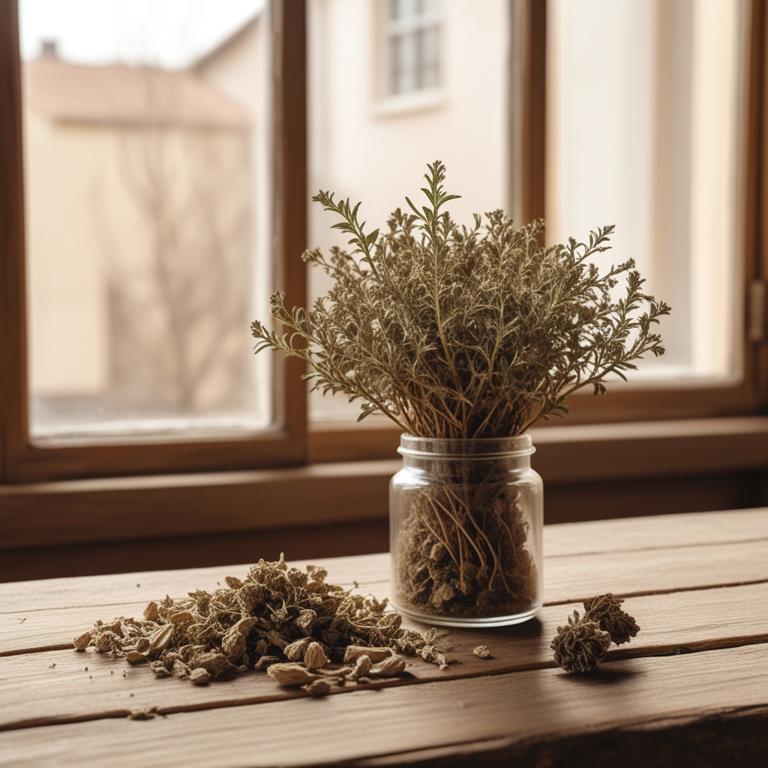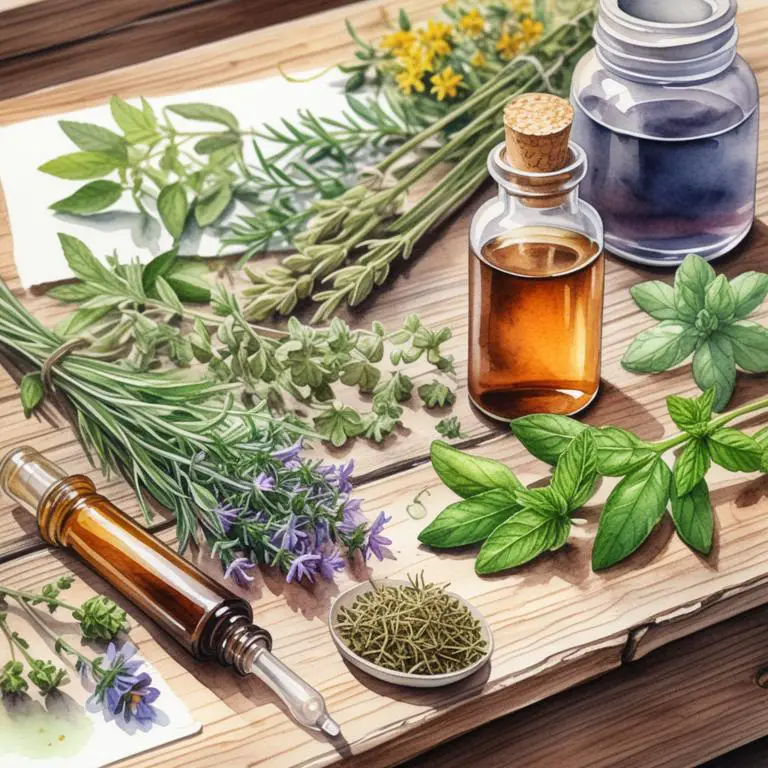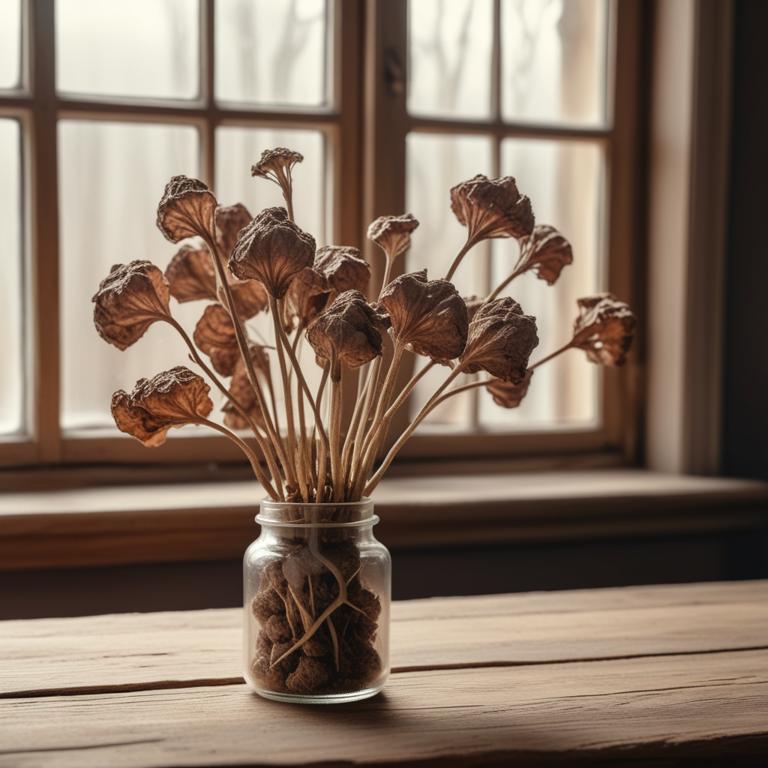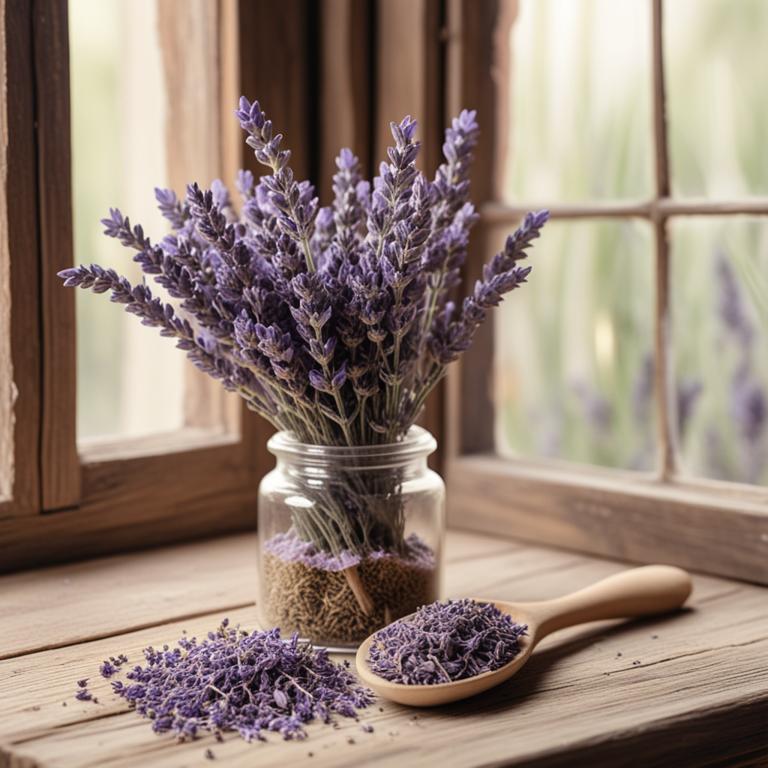Updated: Nov 30, 2024
8 Herbal Tinctures For Jaw Pain
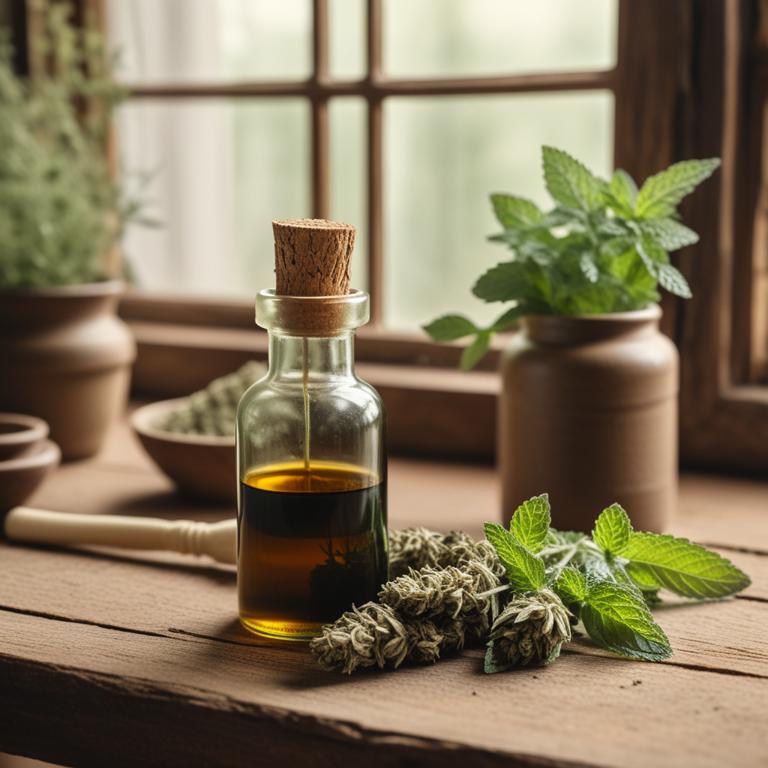
If you're experiencing jaw pain, you might want to try using herbal tinctures as a natural remedy.
Tinctures are concentrated liquids made from herbs that can be taken orally. They work by targeting the underlying causes of jaw pain, such as inflammation and muscle tension. Herbal teas, which are often used to make tinctures, relieve jaw pain because they contain anti-inflammatory and anti-spasmodic compounds. These compounds help reduce swelling and relax the muscles in the jaw, providing quick relief from pain. For example, Zingiber officinale, also known as ginger, has anti-inflammatory properties that can help reduce pain and inflammation in the jaw. Glycyrrhiza glabra, or licorice root, has anti-spasmodic properties that can help relax the muscles in the jaw, reducing tension and pain.
Salvia officinalis, or sage, has anti-inflammatory and antioxidant properties that can help protect the jaw from further damage and promote healing. Using herbal tinctures for jaw pain can bring several benefits to your life. Firstly, they are a natural alternative to over-the-counter pain medications, which can have side effects and interact with other medications. Secondly, they can be used in combination with other natural remedies, such as heat or cold therapy, to enhance their effectiveness. Lastly, they can be tailored to your specific needs and preferences, allowing you to choose the herbs and tinctures that work best for you. To use herbal tinctures for jaw pain, you can mix a few drops of the tincture with water and drink it as a tea. You can also add the tincture to a warm bath or apply it topically to the affected area.
It's essential to consult with a healthcare professional before using any new herbal remedy, especially if you have any underlying medical conditions or are taking medications.
This article explains in detail what are the best herbal teas for jaw pain and wh.
Also, you may be interested in...
Today Free Bonus!
The Ultimate Herb Drying Checklist
(For Long-Lasting Powerful Medicinal Effect)
How to easily dry herbs that don't mold and that keep their strong medicinal power for more than 1 year.
Table of Contents
1. Zingiber officinale

Zingiber officinale tinctures contains several bioactive constituents, including gingerols and shogaols, which are responsible for its therapeutic effects.
These compounds have anti-inflammatory properties, which help reduce swelling and ease pain in the jaw. The analgesic and antipyretic properties of gingerols and shogaols also make Zingiber officinale tinctures effective in reducing pain and inflammation. The warming sensation produced by Zingiber officinale tinctures can help relax the jaw muscles and improve blood flow, further alleviating pain.
Regular use of Zingiber officinale tinctures may also help reduce the frequency and severity of jaw pain episodes.
- Gather 1 cup of fresh ginger root, vodka (at least 80 proof), and a clean glass jar with a lid.
- Slice the ginger root thinly and pack it into the glass jar, leaving 1 inch of space at the top.
- Pour enough vodka over the ginger to cover it completely, then close the jar and shake well.
- Store the jar in a cool, dark place and let it sit for 2-3 weeks, shaking the jar every day.
- Strain the liquid through a cheesecloth or a coffee filter into another clean glass bottle, discarding the solids.
2. Glycyrrhiza glabra

Glycyrrhiza glabra tinctures contains glycyrrhizin, a triterpenoid saponin that is known for its anti-inflammatory properties.
This property helps to reduce swelling and pain in the jaw, making it a popular treatment for temporomandibular joint (TMJ) disorders. Glycyrrhizin also has a sedative effect on the body, which can help to relax the jaw muscles and reduce tension. The tincture also contains flavonoids and phenolic acids, which have antioxidant properties that can help to reduce inflammation and promote healing.
By reducing inflammation and promoting relaxation, Glycyrrhiza glabra tinctures can help to alleviate jaw pain and discomfort.
- Gather 1 cup of Glycyrrhiza glabra root, 2 cups of vodka, and a clean glass jar with a lid.
- Place the Glycyrrhiza glabra root in the glass jar.
- Pour 2 cups of vodka over the root, making sure it covers the root completely.
- Seal the jar and let it sit in a cool, dark place for 2 weeks, shaking the jar every day.
- After 2 weeks, strain the liquid through a cheesecloth or a coffee filter into another clean glass jar. Discard the solids and store the tincture in a cool, dark place.
3. Salvia officinalis
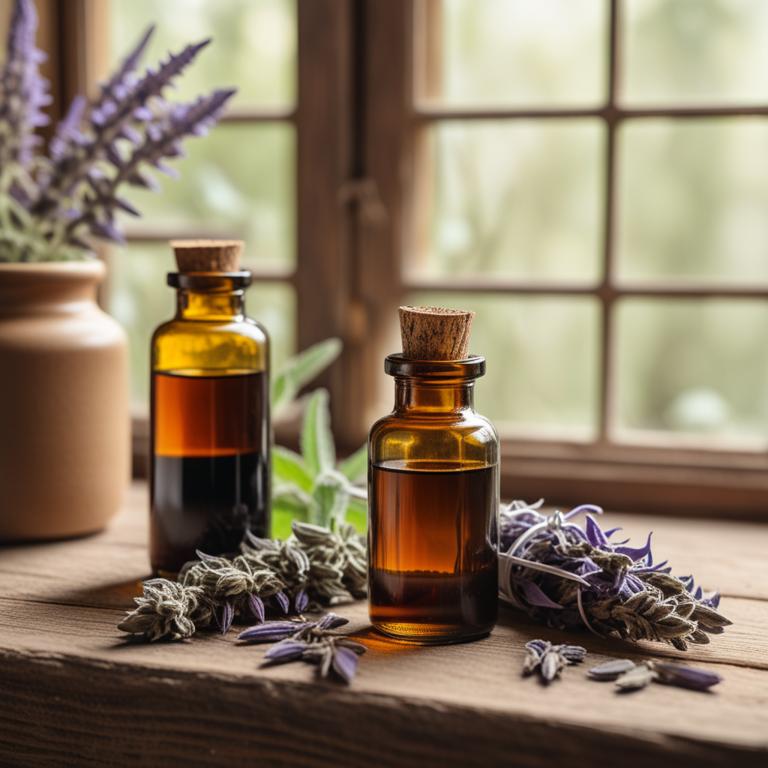
Salvia officinalis tinctures contains rosmarinic acid and borneol as its bioactive constituents.
These compounds have anti-inflammatory and analgesic properties, which can help reduce swelling and pain in the jaw. Rosmarinic acid, in particular, is known for its ability to block the production of inflammatory chemicals, such as prostaglandins, that can contribute to jaw pain. Borneol has a sedative effect, which can help relax tense muscles in the jaw and surrounding areas, providing relief from pain.
By reducing inflammation and promoting relaxation, Salvia officinalis tinctures may provide relief from jaw pain.
- Gather 1 cup of fresh Salvia officinalis leaves and 2 cups of 80% vodka in a clean glass container.
- Chop the leaves into small pieces and add them to the container with the vodka.
- Close the container and store it in a cool, dark place for 2-3 weeks, shaking it every day.
- After 2-3 weeks, strain the liquid through a cheesecloth or a coffee filter into another clean glass container.
- Label the container and store it in a cool, dark place. Take 20 drops of the tincture 3-4 times a day as needed for jaw pain relief.
4. Curcuma longa

Curcuma longa tinctures contains curcuminoids, specifically curcumin, demethoxycurcumin, and bisdemethoxycurcumin.
These compounds have anti-inflammatory properties that can help reduce swelling and pain in the jaw. The curcuminoids also have potent antioxidant properties, which can help protect the jaw from oxidative stress and damage. Curcuma longa tinctures may also contain other bioactive compounds like volatile oils, which have analgesic and anti-inflammatory properties that can help relieve jaw pain.
The combination of these bioactive compounds in Curcuma longa tinctures may make it a helpful natural remedy for jaw pain.
- Gather 1 cup of fresh or dried Curcuma longa roots and 2 cups of 80-proof vodka in a clean glass jar.
- Add the Curcuma longa roots to the jar, leaving 1 inch of space at the top.
- Seal the jar and let it sit in a cool, dark place for 2-3 weeks, shaking the jar daily.
- Strain the liquid through a cheesecloth or a coffee filter into another clean glass jar, discarding the solids.
- Store the tincture in a cool, dark place and use 20-30 drops as needed to relieve jaw pain.
5. Echinacea purpurea

Echinacea purpurea tinctures contains bioactive constituents like alkylamides, glycosides, and phenolic acids.
These compounds have anti-inflammatory properties that help reduce swelling and pain in the jaw. Alkylamides, specifically, have been shown to inhibit the production of pro-inflammatory chemicals, which can contribute to jaw pain. The glycosides in Echinacea purpurea tincture may also help reduce inflammation by blocking the activity of enzymes that promote pain and swelling.
By reducing inflammation and pain, Echinacea purpurea tinctures can help alleviate jaw pain and promote overall jaw health.
- Gather 1 cup of fresh Echinacea purpurea flowers, 2 cups of vodka, and a clean glass jar.
- Combine Echinacea flowers and vodka in the glass jar. Make sure the flowers are completely covered by the vodka.
- Steep the mixture in a cool, dark place for 2-3 weeks, shaking the jar every day.
- Strain the mixture through a cheesecloth or a coffee filter into another clean glass jar. Discard the solids.
- Label the jar and store it in a cool, dark place. Use 20-30 drops of the tincture in water as needed to relieve jaw pain.
6. Ginkgo biloba

Ginkgo biloba tinctures contains bioactive constituents like flavonoids and terpenoids.
These compounds work together to improve blood flow and reduce inflammation in the body, which can help alleviate jaw pain caused by poor circulation. The flavonoids in Ginkgo biloba tinctures, particularly quercetin and kaempferol, have antioxidant properties that help protect against cell damage and promote healing in the jaw and surrounding areas. The terpenoids, such as ginkgolides and bilobalide, also help to relax blood vessels and improve oxygen delivery to the affected tissues.
By addressing the underlying causes of jaw pain, Ginkgo biloba tinctures may help reduce discomfort and promote a sense of relief.
- Gather 1 cup of fresh Ginkgo biloba leaves and 2 cups of 80% vodka in a clean glass jar.
- Add the Ginkgo biloba leaves to the jar and pour the vodka over them, making sure the leaves are fully covered.
- Seal the jar and let it sit in a cool, dark place for 2-3 weeks, shaking the jar every day.
- After 2-3 weeks, strain the liquid through a cheesecloth or a coffee filter into another clean glass jar, discarding the solids.
- Store the Ginkgo biloba tincture in a cool, dark place and take 20-30 drops, 2-3 times a day, as needed for jaw pain relief.
7. Cinchona officinalis

Cinchona officinalis tinctures contains a number of bioactive constituents, including quinine, quinidine, and cinchonine.
These compounds have anti-inflammatory properties, which can help reduce swelling and pain in the jaw. The tannins present in Cinchona officinalis also have a numbing effect, which can help alleviate pain and discomfort. Additionally, the alkaloids in the tincture have a relaxing effect on the muscles, which can help relieve tension and pain in the jaw and facial area.
By combining these properties, Cinchona officinalis tinctures can provide effective relief from jaw pain.
- Gather 100g of dried Cinchona officinalis bark, a clean glass jar with a lid, a measuring cup, and a dropper bottle.
- Combine 100g of dried Cinchona officinalis bark with 1 cup of 80-proof vodka in the glass jar.
- Seal the jar and store it in a cool, dark place for 2 weeks, shaking the jar every day.
- Strain the liquid through a cheesecloth into the dropper bottle, discarding the solids.
- Label the bottle with the date and the concentration (50:1) and store it in a cool, dark place.
8. Mentha x piperita

Mentha x piperita tinctures contains menthol and menthone as its active constituents.
These compounds have analgesic and anti-inflammatory properties, which help to reduce pain and swelling in the jaw. The menthol in Mentha x piperita tinctures acts as a local anesthetic, numbing the area and providing relief from pain. The menthone, on the other hand, has anti-inflammatory properties that help to reduce swelling and inflammation in the jaw, which can contribute to pain.
By using Mentha x piperita tinctures, some people have found relief from jaw pain due to its ability to numb the area and reduce inflammation.
- Gather 1 cup of fresh peppermint leaves (Mentha x piperita) and 2 cups of vodka (at least 40% ABV) in a clean glass jar.
- Pack the peppermint leaves into the jar, leaving about 1 inch of space at the top.
- Pour the vodka over the peppermint leaves, making sure that they are completely covered.
- Close the jar and let it sit in a cool, dark place for 2-3 weeks, shaking the jar every day.
- After 2-3 weeks, strain the liquid through a cheesecloth or a coffee filter into another clean glass bottle. Discard the solids. Store the tincture in a cool, dark place.
FAQ
Can drinking herbal tea prevent jaw pain from forming?
Drinking herbal tea may help reduce jaw pain.
Certain herbs like ginger and peppermint have anti-inflammatory properties that can ease tension in the jaw muscles. Some herbal teas also have a calming effect, which can help manage stress and anxiety that may contribute to jaw pain.
This may lead to relief from jaw tension.
Is it safe to consume herbal teas for jaw pain every day?
Herbal teas can help with jaw pain, but it's essential to use them wisely.
Drinking them daily can be safe, but be aware that some herbs can interact with medications or have side effects.
Choose a tea that's known for its pain-relieving properties, like ginger or willow bark, and follow the recommended dosage to avoid any issues.
How long does it take for herbal teas to show results in jaw pain?
Herbal teas can start showing results in jaw pain relief within a few days to a week.
Some people notice a decrease in pain and inflammation after drinking them regularly.
The timing depends on the individual and the specific herbs used, such as peppermint, chamomile, or ginger, which are known for their anti-inflammatory properties.
Related Articles

Natural Relief for Cramps: Medicinal Herbs and Their Preparations
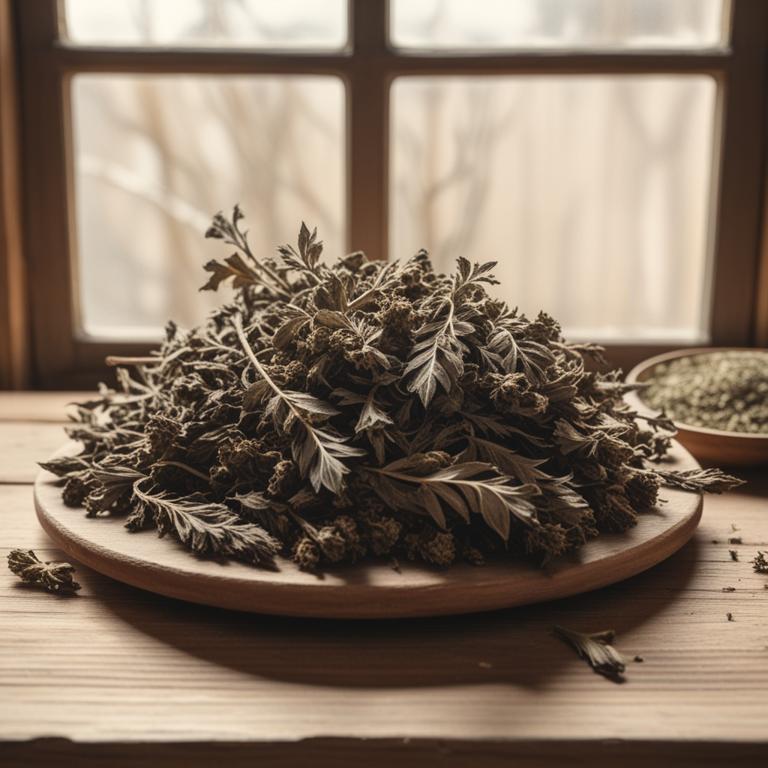
Back Pain Causes and Herbal Treatments for a Pain-Free Life
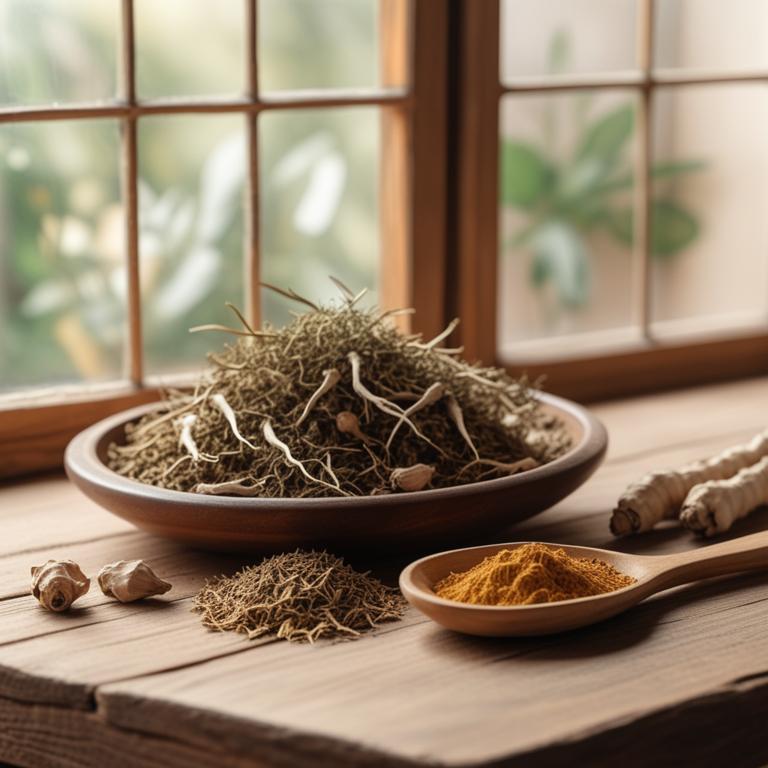
Knee Swelling: A Guide to Medicinal Herbs and Natural Preparations
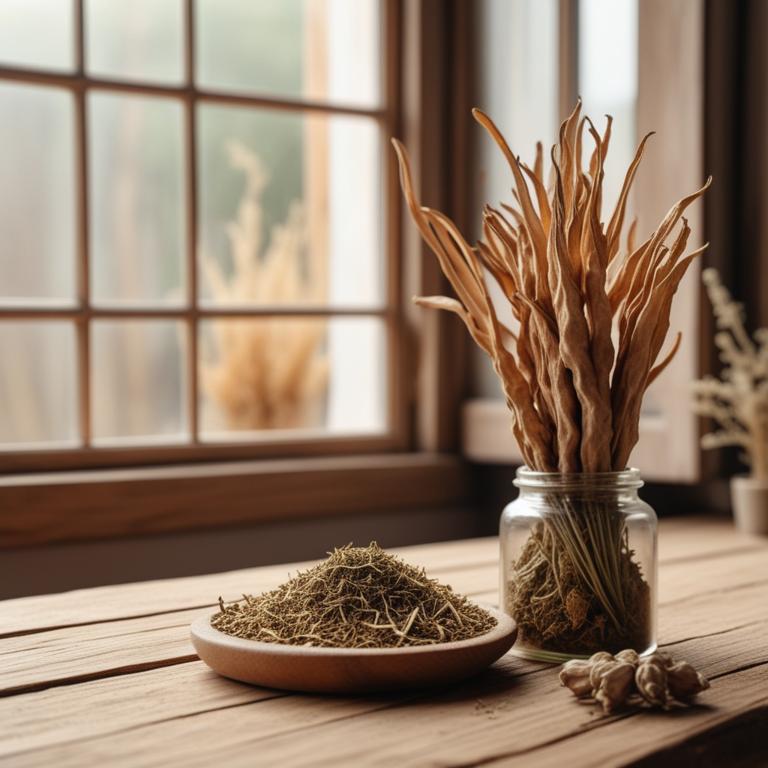
Osteoporosis: Exploring Causes, Medicinal Herbs, and Herbal Preparations
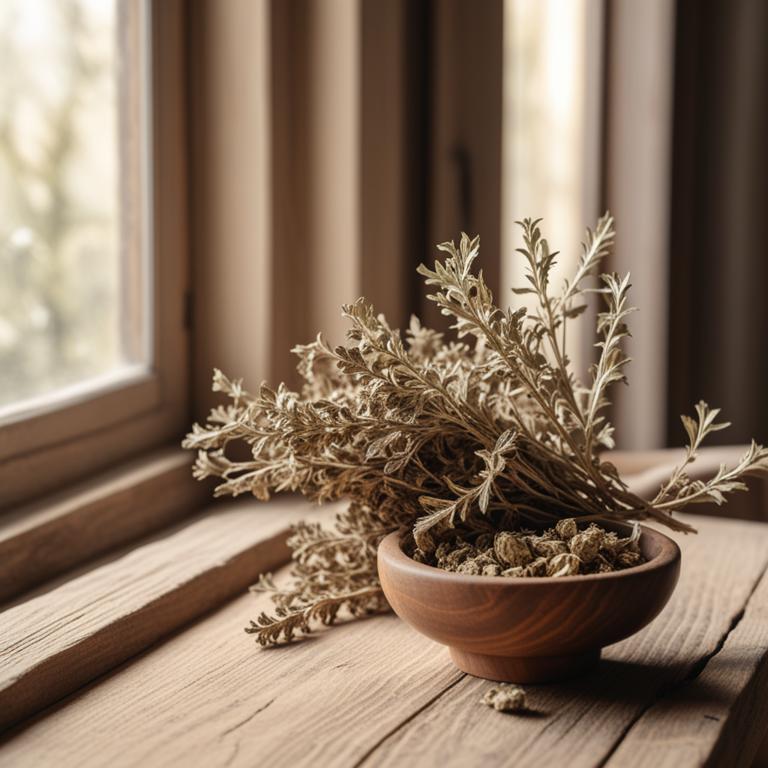
Jaw Lock: Causes, Medicinal Herbs, and Alternative Herbal Treatments
